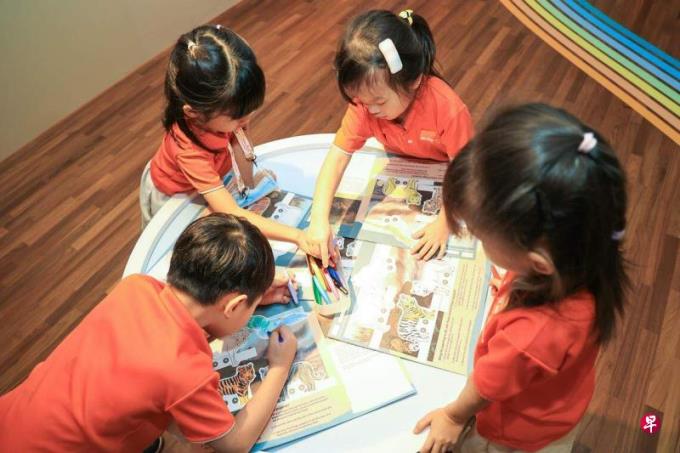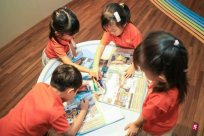
In my work, I often have the opportunity to discuss the development history of children's education with students.Summarize the common point of children's education theory proposed by more than 18th to 20th century, that is, to let children touch nature and society, through experience and operation, and often interact with people.Mature and naturally develops.
There are constant natural disasters on the earth. How can parents and educators cultivate children in the 2020s and help them grow up to be challenging the world?
If children want to grow up healthy, in addition to having good physical fitness and social and emotional skills, they must also have the ability to adapt to changes in social environment.But to gain this ability, you must first cultivate children's environmental consciousness and social awareness.The so -called "consciousness", from the perspective of psychology, is a state of perception, that is, understanding and perception information, and integrating this information.To cultivate children's environment and social consciousness, as early as the educational principle proposed by early educators, children must be explorated by children, contacting various social activities, and the situation of interaction with nature and social and social.information.
Tentile stimulation is not conducive to brain development
Children growing in rural areas will inevitably obtain the knowledge of weather changes affecting crops and farmers' lives, as well as sources of food.Children growing in the seismic area not only understand the power of earthquake destruction, but also experience the damage and inconvenience caused by the earthquake to people.Children growing in Singapore, although there is no need to face natural disasters such as typhoon earthquakes, but because human beings have damaged the natural ecology, the climate changes in various places will not only affect the growth of crops and the environment where people live.The danger of these seriously threatens human survival, and Singaporeans will not be spared.Although the serious crown disease has passed, the virus still lives in the human environment.Therefore, in order to cultivate the future social adaptability of children in Singapore, in addition to providing knowledge and skills in the fields of language, number concepts and art, parents and teachers must also cultivate children's environment and social consciousness to help them obtain the environment, food sources and food sources and food sources.Prevent infectious diseases related to survival.
During the implementation of crown disease control protection measures, the Internet has developed a variety of online teaching platforms and online teaching materials.In the case of lack of contact with real materials and contexts, children cannot obtain the true concept of things. This not only affects their cognitive ability development, but also difficult to cultivate environmental and social consciousness. The lack of tactile stimulation is not conducive to the development of children's brains.
The National School of Education and Education has launched a number of short -term training courses for kindergarten teachers who teaching outdoor teaching in recent years to encourage teachers to let children come into contact with the outdoor environment, including the natural environment and artificial facilities, and design various interesting and operable activities.Let's promote the development of children's actions, social, counting concepts, and creativity.Outdoor activities can not only exercise children's physical fitness, but also cultivate environmental and social consciousness.
6 -year -old children go to Duoguang Island Camping
In addition to outdoor activities, children can experience different living environments, not only can cultivate the environment and social consciousness, but also exercise their ability to adapt to different environments.
On October 4th, the Strait Times reported that the principals and faculty members of the local non -profit childcare institution, Creative O Preschoolers'bay, led a group of 6 -year -old children to the entire process of camping in Demogurtle Camping.EssenceFrom the video, photos and text records on the webpage, we can see that this group of children show the ability to initially adapt to different living environments.For example, in the camp without parents, children use a cup to scoop the water in the large bucket without the faucet and wash basin, squatting to brush the teeth and wash their hands; prepare meals with the aunt who cooks, and use it.Wash the tableware in the water basin; under the supervision of the teacher, learn to get fire in charcoal to carry out the activities of barbecue food; lay a sleeping bag and sleep with other children on the long wooden bed; through the instructor's guidance, accept the fieldSkills training, such as exploring Deguang Island, skiing, ropes, and so on at night.The activity allows children to deeply experience the value of material resources.
Example tells us that as long as there is an opportunity to exercise, children 6 years old can also try to adapt to a challenging living environment.
Singapore is a highly urbanized country, with complete facilities housing and four -way transportation system, making our children live easily.Therefore, parents and educators must work together to create opportunities for children, such as contacting and exploring nature and neighboring environment, and interact with people of different backgrounds, occupations and age.Their environment and social consciousness.
Guiding children to understand and cope with changing nature and social environment from an early age, not to make them "more concerned". What is important is that if children can sensitively notice the changes in the living environment they are, they can adapt to change and change and change and change and change and change and change and change and change and change and change and change and change and change and change and change and change and change and change and change and change and change and change and change and change and change and change and change and change and change and change and change and change their changes.Make an appropriate response, the establishment of this ability is conducive to their various challenges in the future.
The author is a senior lecturer at the Children's Teacher Training School


